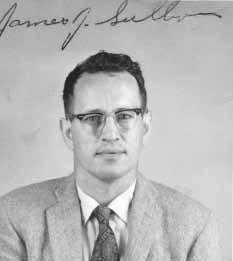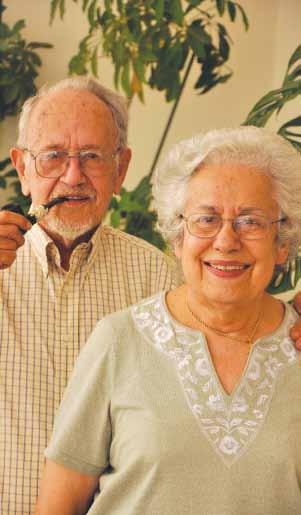
4 minute read
Down Memory Lane
“Mr and Mrs Sullivan” – known to all alumni who graduated before 1991 - are back in Beirut on a visit. At 90, James Sullivan still smokes his infamous pipe and Samia Sullivan still has that firm yet maternal look. During their visit, Samia (while it’s innately difficult for former students like myself to refer to the Sullivans by anything but “Mr” and “Mrs” , for the article’s sake, first names simply must be used), can easily be spotted almost every day at the elementary school. “It’s my ‘baby’,” she said. “I grew in it.” Former students immediately rush to greet her, dragging along their children for Samia to see. (Even yours truly insisted she fawn over her children’s wallet pictures). Over lemonade and scrumptious brownies at the home of a relative in Ras Beirut, the couple tease each other as they remember IC days gone by.
“She was pretty,” said James simply, “so I married her.”
That was in 1967. Samia Khalaf joined IC in 1944 as an office manager. In the next 48 years, she made her way to the director of the elementary school. Meanwhile, James, who was then teaching in NY, was hired in 1960 by then principal, Leslie Leavitt as an art teacher and boarding director. Unbeknown to Leavitt, he had made a monumental decision. Years later, as the Lebanese civil war broke out, the Sullivans would prove to be instrumental in keeping the school’s boarders safe. livan wouldn’t be James Sullivan without the pipe. So infamous was the pipe that during the civil war when mail would take months get come through, James received a St Patrick’s Day card from a former student mailed three days earlier from the US. It was simply addressed to “Abou Ghalioun” (father off the pipe), Beirut.” The confused post office, seeing a card from the US, simply delivered it to AUB. Staff there quickly figured out that Abou Ghalioun can be no other than James Sullivan.
Truth be told, if a book ever needed to be written about IC, it would be written by the Sullivans. “I started to ten years ago,” admits Samia, “but life is so busy that I never got around to it.”
Their memories are endless. There was the time that James made his way to Thomson Hall dormitory and with a shock saw his car, a Fiat 500, parked in the hallway on the second floor. As a joke, students had carried it up. “This was the type of trick kids played then,” he said laughing. “I can tell you the staff had a lot fun taking it back down.”
And then there was another time that James was summoned to save a student who was jumping over the IC fence to Bliss street (boarders were only allowed out with passes. Those whose passes were revoked would sometimes jump over the fence to catch the tramway) and got stuck on top. Much to the embarrassment of the student, James had to climb up and rescue him. Today, the student is a leading figure in the Gulf.
That was a time when parents showed deep respect to teachers. Upon hearing that James wanted to meet with him on his next visit to Beirut, one Saudi Arabian father took a camel, bus, train, and plane and was knocking on the Sullivans’ door three days later.
But as Samia puts it, the “nightmare” began once the civil war erupted in 1975. As the battles intensified, keeping the students safe was a perilous challenge. Years later, Samia still shudders at one
near miss tragedy incident. During one battle, the Sullivans shepherded their students to the ACS building which was deemed safer. About 25 young boarders were huddled in one room. After a while, Samia felt unsettled and moved the youngsters out. “Something told me that we have to get those children out of there,” she said. Ten minutes later, the room took a direct hit.
Another time, the staff joined the boarders as they huddled together for days on end. Mattresses were laid all around the Sullivan’s home (today’s business office and bookshop), Samia found herself cooking for 40 people on one small hot plate while James provided potable water by filtering it through paper towels.
Other times, during battles, James and a supervisor would run up between battles to the cafeteria (today’s preschool), grab food and run back to the boarders. During one such run, a shell fell near them. Jumping in panic, the supervisor somehow managed a somersault and landed on firm ground with the tray of food intact. “You see Mr Sullivan,” he cried out. “I didn’t spill any!”
Humour kept them going. In one incidence, the Sullivans received a package. Someone decided that it must be a bomb and the police were summoned. The officers promptly put the package near the elementary school building (with students inside) and before the Sullivans could stop them, shot at the package. There was no explosion. “It’s definitely not a bomb,” declared the police. As it turned out, it was a crystal bowl now permanently chipped.
In 1986, James as a US citizen – on holiday abroad – was forbidden by US officials to return to Lebanon. Samia remained at IC as the elementary school director. In 1991, she retired and joined her husband in North Carolina.
Since then, the couple visit Lebanon every year.









